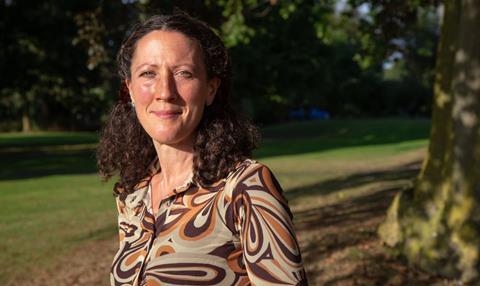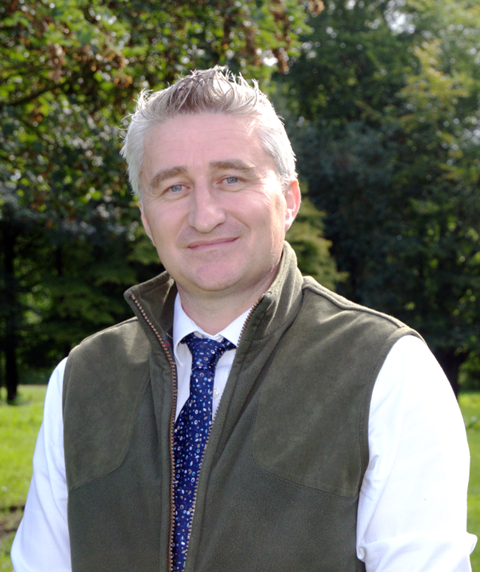ABP’s PRISM 2030 (PRogramme for the Improvement in Sustainability of (red) Meat) initiative brought beef and lamb farmers and technical experts together, for a grazing and knowledge transfer event on a suckler beef farm in Cheshire.

Participants were offered a first look at initial findings of the ABP PRISM research, which aims to help red meat producers reduce their carbon footprint.
Farmer Ian Norbury hosted the gathering on his farm near Mobberley, and explained what business changes he has implemented since joining PRISM 2030. Norbury manages a herd of 120 pedigree Angus cows, selling breeding bulls and finishing heifers and steers for ABP. He joined PRISM 2030 in Autumn 2022 having already used the carbon calculator, Agrecalc, to measure his farm’s GHG emissions back in 2020.
He then identified ways to reduce emissions, primarily planting herbal leys and rotationally grazing cattle, eliminating fertiliser requirement, and improving daily liveweight gains. Now, he outwinters finishing cattle on bale grazing, only housing calving cows during late winter, minimising straw use and keeping nitrogen on the grassland.
Many of the forage bales made on the farm are tight baled and so require no wrap, eliminating plastic waste, reducing input costs and minimising labour demands during winter.
Regular weighing of cattle means he can select smaller heifers for breeding and finish larger framed heifers, monitoring growth rates and feeding accordingly. Norbury has reduced mature cow weight from 780kg to 650kg over the past four years, reducing the overall carbon footprint of each cow.
PRISM 2030 offered Norbury the opportunity he sought, to repeat his carbon calculations with Agrecalc, and presented him with advice from The Andersons Centre, Harper Adams University (HAU) and other farmers involved.
Illustrating how small changes impact wider sustainability goals
During the morning, farmers from up to several hours away were joined by ABP’s PRISM 2030 partners of farm business consultants The Andersons Centre (Andersons), Professor Jude Capper of HAU and Agrecalc.
Professor Capper told farmers that the findings from the project so far are proving helpful in illustrating just how much those involved are achieving, by monitoring and reducing their farm carbon emissions, with the support of ABP.
She said: “It’s really important for our industry - which faces arguably more than its fair share of criticism - to be armed with much more accurate, representative data which we can point to.
“We already know some of the broad factors which effects the carbon footprint of a farm but what we don’t is how that plays out on-farm. Often, we see two similar farms but with very different carbon footprints.
"We also see seemingly high-performing farms, which in theory ought to have a lower carbon footprint, with higher ones than lesser-performing farms. This project will help us to understand why.”
Moving around different aspects of the farm, The Andersons Centre and Agrecalc explained their role in assessing farm carbon emissions and offering recommendations, and Norbury gave insight into his handling system investment, planting and management of GS4 leys and led a tour of the bale grazing set-up, ready for cattle to turn out into during November.
Through PRISM 2030, ABP hosts discussion groups, gives advice and offers a Sustainability Grant, to support investment with improvements such as herbal ley mixtures, weigh-scales and handling systems.
Katie Thorley, ABP’s Agri Sustainability manager, said the project "is vital for supporting farmers and communicating UK agriculture’s strong sustainability position."
She said: “Investing in PRISM is partly about telling the story of British farming.
“There is no doubt in my mind that many people have negative connotations around the impacts of farming, and we must tell the real story and demonstrate all that is good about our sector.
“Every farm will be re-tested in two years’ time, and we very much look forward to watching PRISM 2030 progress and finding out what the next chapters reveal.”
HAU School of Sustainable Food and Farming Delivery Partner Network
ABP has also joined the HAU School of Sustainable Food and Farming Delivery Partner Network, which aims to develop sustainable farming methods and help British farmers achieve net zero.

The partnership is in addition to ABP’s direct association with HAU, where the company sponsors the Professorship in Sustainable Beef and Lamb production. The post, which is held by Professor Capper, is committed to leading the development of postgraduate research into sustainable meat production systems.
The work by Professor Capper's team initially focused on using a data-driven approach to improving the genetics available to the beef herd, so that beef animals grow faster by optimising their feed conversion ratio; and are therefore ready for slaughter at a younger age. ABP stated that the ultimate aim is to support the industry’s ambition of reducing emissions and demonstrate the industry’s climate credentials.
Commenting on the partnership, Phil Hambling, UK head of CSR for ABP said: “We are committed to playing our part in helping our farmers become global leaders in the production of sustainable beef and lamb.
"Our existing projects with Harper Adams University are helping us with evidence to dispel some of the myths about beef and lamb’s carbon footprint but also showing how we can improve productivity and benefit farm business resilience.
"Our partnership approach with farmers and Harper will ensure that we can build on our early progress, demonstrate how we can continuously improve and celebrate the positive story that British agriculture has to offer."
This story was originally published on a previous version of the Meat Management website and so there may be some missing images and formatting issues.















